Remembrance of the Daleks (episode four, 26 October 1988)
SPOILER ALERT: We are discussing some of the Doctor Who adventures broadcast over the past 50 years. In this blog, we're looking at Remembrance of the Daleks. It contains spoilers about the entire story.
"Poor old John Nathan-Turner," fans are fond of saying. "Always going back to Totter's Lane." Just one of the litany of crimes laid at the door of Doctor Who's longest-serving producer was his fixation with the show's history. He was overly fond, the argument goes, of weaving in oblique references and going back over old ground that the casual viewer wouldn't be able to hope to understand. And yet the one time he actually did return to the very beginning (Totter's Lane being the junkyard in Shoreditch where the very first story took place), things went rather well.
At the Coal Hill school, teachers Ian and Barbara have just gone off flying with eccentric young student Susan and her even more eccentric grandfather. But that grandfather returns to the school after what appears to be minutes (the French-revolution book Susan had been reading, and questioning the accuracy of, is still on the classroom table) – 25 TV years later. He's back with a different face, because he has left something important behind – the Hand of Omega, a powerful stellar manipulator that held the secret of time travel at Gallifrey's beginnings. And the Daleks are after it.
Remembrance of the Daleks was when Doctor Who started to get its groove back. In the 25th-anniversary year, an old enemy was given a reboot, a hat was tipped to the show's history and a spunky new companion got to batter a Dalek with a baseball bat. The story had a sharp political subtext, the brazen racism of 1960s London a counterpoint the Daleks' fascistic tendencies. And it marked the true arrival of Sylvester McCoy's Doctor after a naff first year. It takes a new twist on the character for him to be able to face off with Davros with a line about "unlimited rice pudding" and make it sound like a proper scalding. It deserves its iconic status.
After the troubles of the Colin Baker era, replacement Sylvester McCoy had a patchy first series which didn't completely inspire confidence. So it was a surprise that the programme would enjoy some final spasms of life before expiring two years later. Your first Doctor is always kind of your favourite, and McCoy was mine.
Life aboard the Tardis
Dorothy Gale McShane preferred to be known as Ace. She was a tomboy from the suburb of Perivale who wore a bomber jacket and brewed home-made explosives "Nitro 9") in her bedroom. She spoke in far more BBC tones than her supposedly "scally" character would have, but for all that, she was the most real and relatable companion since Sarah-Jane. And she was finally a departure from the screechy-asking-questions companions: she and the Doctor were a proper double-act, just as Sylvester and Sophie were and still are in real life. The subsequent series, through stories such as Ghost Light and The Curse Of Fenric, was pretty much all about Ace's story arc, with the bullish layers peeled back to reveal the frightened human girl beneath. Because the show was axed, Ace never got an exit. It is said that the planned arc was for her to be the Doctor's apprentice, with him eventually taking her to Gallifrey to train at the academy. Subsequent spin-off fictions have her as everything from becoming a feral Dalek hunter to ending up a noblewoman in 19th century Paris.
And, yes, the Dorothy Gale bit is a deliberate nod to The Wizard of Oz, because she was introduced after being swept up by a time storm in Dragonfire. It's almost as if lots of Doctor Who fans and staff are friends of Dorothy or something.
Behind the sofa
As Steven Moffat has said, the frequency with which the Daleks appear in the show also serves to make them the most easily defeatable species in the universe. But even so, by this point they had become seriously emasculated. When the series came back in 2005, plenty of headlines were made out of the fact that the trundling trolleys could now fly, taking away the "staircase defence". But Remembrance did it first. That cliffhanger to episode one has the Doctor trapped in the basement, thinking he's safe, only for the Dalek to elevate toward him up the stairs. It was genuinely disquieting moment. Suddenly they were scary again. But the Daleks got more of an upgrade than just the ability to fly. The special weapons Dalek, with its flattish dome and bazooka, is a thing of beauty. Wider than that, though, was the very notion of the Dalek civil war. When you have a race of angry warrior cyborgs driven by hate and a desire to kill, it's surely only a matter of time before sects are going to turn on each other. But it had never been done before. And of all the scary elements of this story, we must not discount the Doctor himself …
Behind the scenes
Remembrance also saw the beginning of what has become known as the "Cartmel masterplan". This was a new story arc, the brainchild of new script editor Andrew Cartmel, who felt like all the trotting off to Gallifrey had made the Doctor too cuddly and relatable, and wanted to restore the mystery and danger. The retrieval of the Hand of Omega was intended to be the beginning of a backstory that would reveal the Doctor as having had a much bigger, more ambiguous role in Gallifrey's history, all the way back to the time of the founding fathers, Omega and Rassilon. Further hints were dropped, and McCoy's portrayal became all the darker and more manipulative as his stint went on. The revelations were to have arrived in the planned 27th series, but the show's cancellation meant they never came.
Fragments
At the BFI event for this story, I finally lost any modicum of professionalism and went completely fangirl on Sophie Aldred in the hospitality room. One of the things we talked about was which version of Ace's fate she holds with. She said the one where she's the companion who never leaves him, and eventually grows old and dies on the Tardis. I nearly cried.
Then we talked about what might have happened to the other character she was playing at the time, Maureen from Melvin and Maureen's Musicograms. "She's probably doing smack," she replied.
"You can always judge a man by the quality of his enemies," has to go down as one of the most quotable lines in all of Doctor Who.
The weapons Dalek returned in last year's Asylum of the Daleks and fans everywhere cheered.
Further reading
Friend of the blog @grumblenook writes for DoctorWho.TV about the story, including the tantalising possibility of a return to Totter's Lane.
And another friend of the blog, @BlogtorWho takes us through that excellent BFI session.
Next time
The sensible thing would probably be to do The Curse of Fenric. We're not going to do that. We're going to do The Happiness Patrol, aka the gayest Doctor Who story of all time.
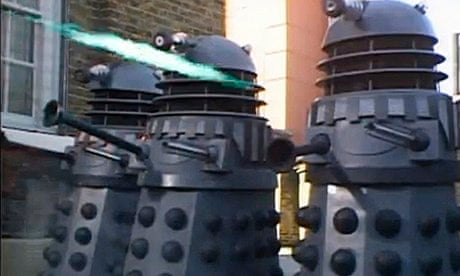
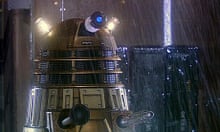


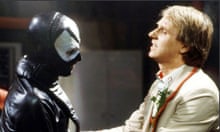
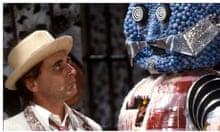

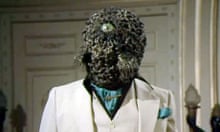
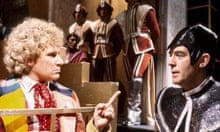
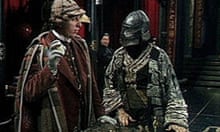
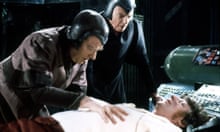
Comments (…)
Sign in or create your Guardian account to join the discussion